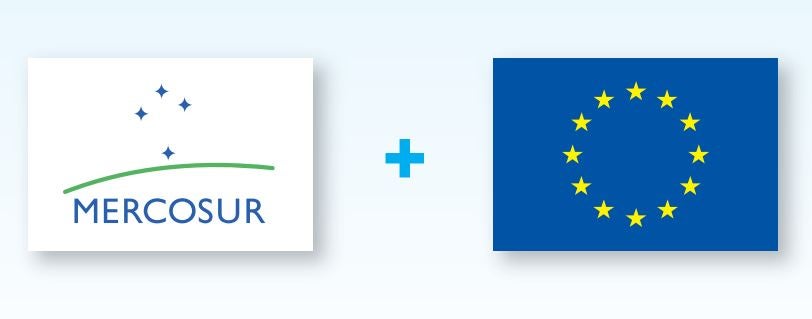When the European Union (EU) and Mercosur recently announced their free trade agreement after 20 years of negotiations, we were elated. This pact cements a historic opportunity for the four Southern Cone countries to grow their economies, internationalize their companies, be more competitive, and add new jobs.
The deal is one of the world’s largest, comparable in size to NAFTA when it was ratified. The two blocs account for almost a fourth of the world economy and 37% of global trade in goods and services. At a single stroke, Mercosur’s free trade deals leapt from 1.4% to 23.5% of the world GDP.
While the agreement will obviously have a substantial impact on trade and investment flows between the two blocs, it also carries several regional and global implications.
First, the deal serves to defuse tension within the Mercosur, signaling its members’ willingness and ability to overhaul their trade integration. This should allow the four countries to move towards resolving outstanding issues in their relations so they can be more competitive and extend to each other the preferential treatment granted to the EU.
Second, it will make it easier for Mercosur to strike deals in its current negotiations with the European Free Trade Association (EFTA), Canada, Korea, Singapore, and other parties, boosting its agenda with new trade partners. It will also facilitate closer ties with the Pacific Alliance (Chile, Colombia, Peru, and Mexico).
Globally, the deal sends a positive message from both blocs, positioning them as leaders amid growing trade tensions and a complex international political economy that has affected exports from Mercosur countries and the rest of the region. The agreement is also a way to diversify trade ties that are decoupled from the political rollercoaster of the major powers.
Market access
In this area, the agreement will offer significant advantages for exports from the four South American countries. The EU will slash tariffs to zero for 92% of imports from the Mercosur, and 85% of these imports will be liberalized the moment the deal goes into effect.
With the opening of the EU’s doors, Mercosur countries have a chance to increase existing exports and diversify with products not currently exported to Europe. Agricultural goods like certain soy derivatives, oils, fruits, juices, legumes, peanuts, tea and coffee, fishery products, beverages, and others are poised to gain sweeping and immediate access. Grapes, which currently have a 14.4% tariff, will be able to enter duty free.
Mercosur’s industrial sector is another winner, since 80% of its exports to the EU will immediately have zero tariffs, and within 10 years 100% will be exempt from duties. While Europe is a demanding market, Mercosur has niches that can be competitive and would benefit from this preferential treatment, like leather goods, designer apparel, or biotechnology.
The deal also presents other opportunities for Mercosur companies. For example, once the agreement takes effect, they can participate on equal footing as bidders in European Union tendering processes for both goods and professional services—a market worth nearly €3 trillion.
Upsurge in foreign direct investment
The deal should also lead to more European Union investment. The agreement affords legal certainty, enhances the business climate, and grants the European market special access, making Mercosur member countries more attractive as destinations for Foreign Direct Investment (FDI) and as links in regional and global value chains.
Experience shows that free-trade deals drive major increases in FDI for signatory countries. In Chile, for example, European investment grew six fold in 14 years.
The pact can also be expected to stimulate already competitive Mercosur exports of knowledge-based services. The EU is the world’s top services importer, but only $12.4 billion of the $800 billion in services it imports come from these four countries.
As for politics, the dialogue and cooperation mechanisms written into the agreement should help strengthen the alliance between the two blocks and bolster institutional structures in Mercosur countries.
Supporting the European Union and Mercosur agreement
The Inter-American Development Bank, and its Integration and Trade Sector in particular, has stood behind the negotiation process since day one. We will now focus on helping the four Southern Cone countries to fully profit from the deal.
This means spurring on the internationalization of Mercosur companies—starting with small and medium enterprises (SMEs)—by helping them innovate, bring on new technology, and meet international production standards.
These actions should be paired with investments to enhance companies’ efficiency. It will also be important to push for reforms to streamline foreign trade logistics, adopt the highest international standards for trade facilitation, boost regional trade promotion capabilities, and implement production transformation programs to help the most heavily impacted sectors transition.
The region should ramp up its efforts to lay the groundwork for Mercosur companies to be competitive enough to reap the full benefits of this agreement’s opportunities. Focusing exclusively on domestic or captive markets in the region is no longer an option.


Leave a Reply